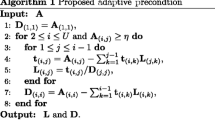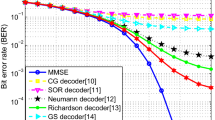Abstract
Multi User—Multiple-input multiple-output based wireless communication system has several advantages over conventional MIMO systems such as high data rate and channel capacity which has drawn great attention recently and is prominently preferred for 5G systems. The other side interferences due to the Multi-User mobile environment such as co-channel interference and multiple access interference the overall system performance will be degraded. Highly reliable techniques need to be incorporated to improve the Quality of services. Moreover, the energy efficiency and compactness requirement of 5G systems present new challenges to investigate techniques for reliable communications. Introducing a novel low-complexity radix factorization based Fast Fourier transform multi beam former and maximal likelihood –multi-user detection techniques. As signal detector tailored with optimal sub-detector systems which results in considerable complexity reduction with intolerable error rate performance. The proposed radix factorized Fast Fourier transform—multi-beam forming architectures have the potential to reduce both hardware complexity and energy consumptions as compared to its state-of-the-art methods while meeting the throughput requirements of emerging 5G devices. Here through simulation results, the efficiency of the scaled ML sub-detector system at the downlink side is compared with the conventional ML detectors. Through experimental results, it is well proved that the proposed detector offers significant hardware and energy efficiency with the least possible error rate performance overhead.



Similar content being viewed by others
References
Ahmed, A. A. M., et al. (2018). MU-MIMO downlink capacity analysis and optimum code weight vector design for 5G big data massive antenna Millimetre wave communication. Wireless Communications and Mobile Computing., 2018, 1–12.
Kim, H. (2020). Design and optimization for 5G wireless communications. Wiley.
Bojkovic, N., Petrovic, M., & Zivojinovic, T. (2020). Intelligent transportation system as an emerging application in 5G. 5G Multimedia Communication. https://doi.org/10.1201/9781003096450-13
Ehab, A., et al. (2017). Beamforming techniques for massive MIMO systems in 5G: Overview, classification and trends for future research. Frontiers of Information Technology & Electronic Engineering, 18(6), 753–772.
Hyukmin, S., & Clerckx, B. (2014). Joint beamforming design for multi-user wireless information and power transfer. IEEE Transactions on Wireless Communications, 13(11), 6397–6409.
Qi-Yue, Y., Meng, W.-X., Yang, M.-C., Zheng, L.-M., & Zhang, Z.-Z. (2016). Virtual multi-beamforming for distributed satellite clusters in space information networks. IEEE Wireless Communications, 23, 95–101.
Suarez, D., Cintra, R. J., Bayer, F. M., Sengupta, A., Kulasekera, S., & Madanayake, A. (2014). Multi-beam RF aperture using multiplierless FFT approximation. Electronics Letters, 50(24), 1788–1790.
Viduneth, A., et al. (2018). Analog approximate-FFT 8/16-beam algorithms, architectures and CMOS circuits for 5G beamforming MIMO transceivers. IEEE Journal on Emerging and Selected Topics in Circuits and Systems, 8(3), 466–479.
Smita, B., & Dwivedi, V. V. (2018). Effect of signal to interference ratio on adaptive beamforming techniques. Journal of King Saud University-Engineering Sciences, 30(4), 313–319.
Gangtao, H., et al. (2017). Orthogonal binary modulation division for two-user uplink massive MIMO systems with noncoherent ML detection. IEEE Communications Letters, 21(2), 294–297.
Funding
This research received no external funding.
Author information
Authors and Affiliations
Contributions
All authors have read and agree to the published version of the manuscript.
Corresponding author
Ethics declarations
Conflict of interest
The authors declare no conflict of interest.
Additional information
Publisher's Note
Springer Nature remains neutral with regard to jurisdictional claims in published maps and institutional affiliations.
Rights and permissions
About this article
Cite this article
Kinol, A.M.J., Nisha, A.S.A., Marshiana, D. et al. Hybrid Multi Beamforming and Multi-User Detection Technique for MU MIMO System. Wireless Pers Commun 124, 3375–3385 (2022). https://doi.org/10.1007/s11277-022-09517-0
Accepted:
Published:
Issue Date:
DOI: https://doi.org/10.1007/s11277-022-09517-0




